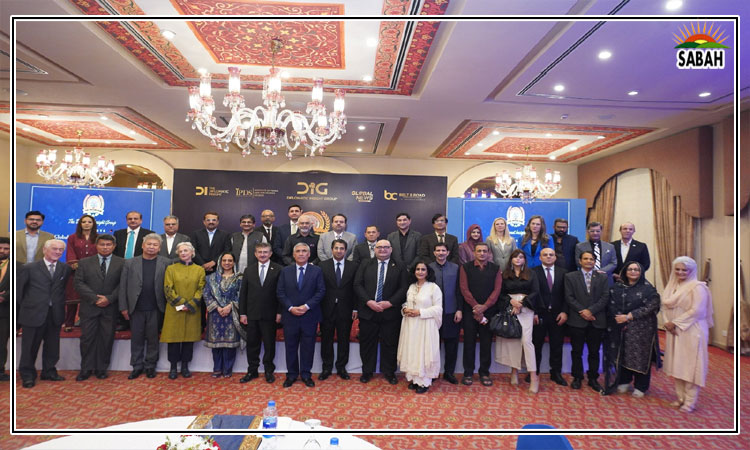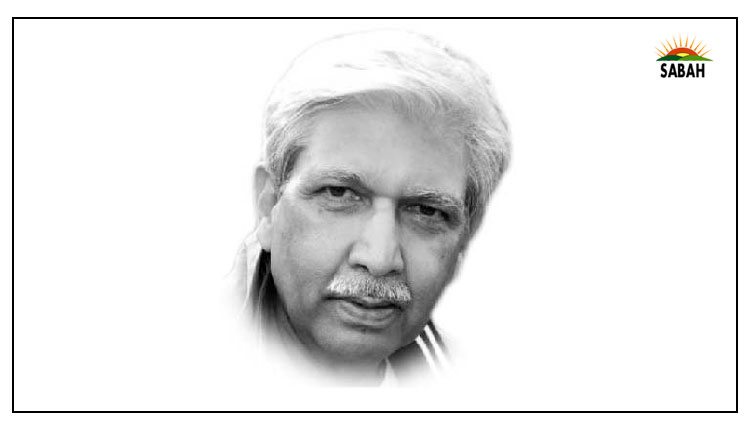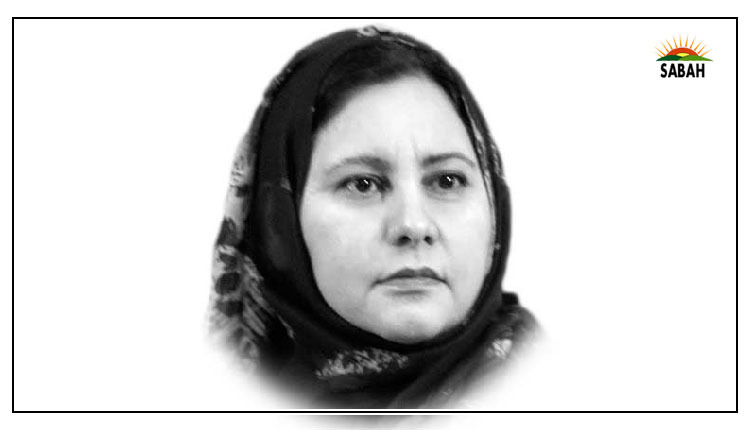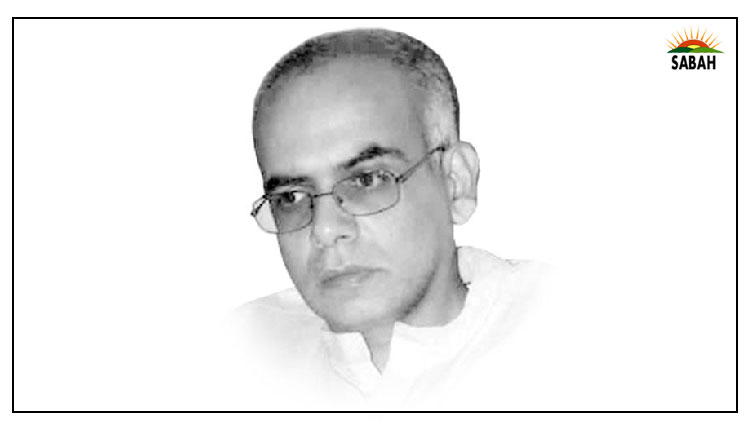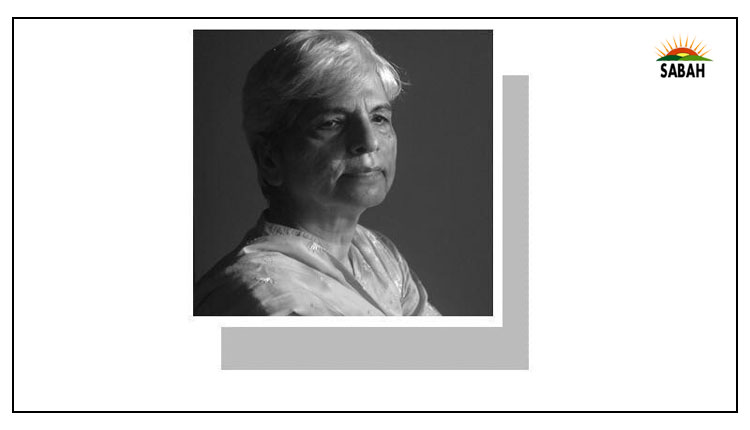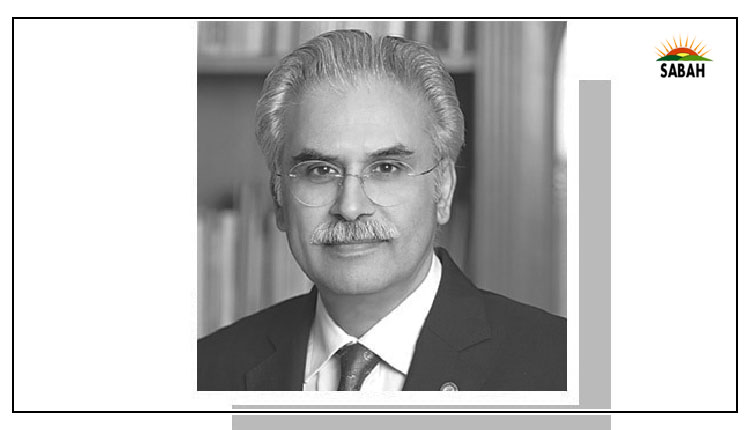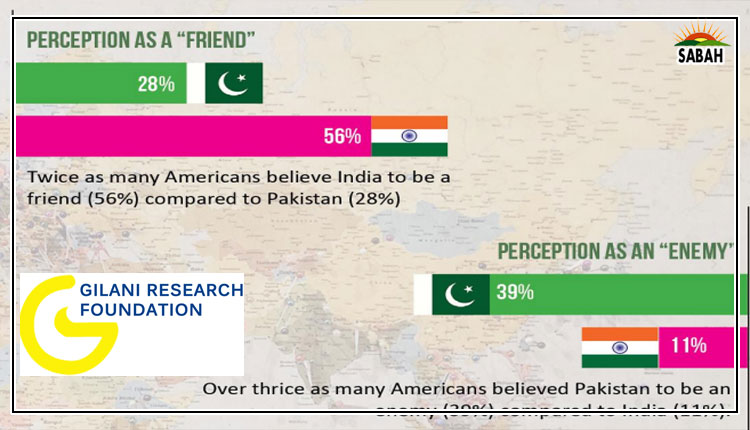Four in 10 Americans consider Pakistan to be an Enemy Country: Gilani Research Foundation Survey
ISLAMABAD, Nov 21 (SABAH): According to a recent survey commissioned by Gilani Research Foundation and conducted by
Leger USA (an opinion polling firm based in US) gauging perceptions that Americans have about Pakistan it was found that nearly 4 in 10 Americans view Pakistan as an Enemy Country and twice as many Americans believe India to be a friend (56%) compared to Pakistan (28%).
The survey was conducted using an Online Panel maintained by Leger USA called as Omni USA. The sample size of the survey was around 1000 men and women. The survey respondents belonged to different parts of US, hailing from different ethnicities as well as gender, education and age backgrounds.
Bilal Ijaz Gilani, Executive Director of Gilani Research Foundation says ‘Opinion of the world citizens about US is a very well researched topic. However, how Americans perceive other nations, especially ones that are poorer than US, is not very well documented. In this research we wanted to understand how perceptions of Americans differ vis a vis various countries including Pakistan. The findings are a bit concerning as more Americans consider Pakistan to be an Enemy country and less consider it to be a Friend Country. There is also widespread ignorance or lack of information about Pakistan. Given Pakistan has been a long-term ally of US since 1950’s, there are almost one million Pakistani Americans, and currently US is the largest trading partner of Pakistan, how Americans perceive Pakistan is quite significant. Moreover, the study reveals that neighboring India has a significantly more positive image among common Americans, however an almost similar proportion of Americans express lack of knowledge or interest in India as they expressed for Pakistan. In other volumes of this report, we will also share findings about the another 5 countries and their perceptions amongst Americans.
Key learnings from the survey are below
1. Twice as many Americans believe India to be a friend (56%) compared to Pakistan (28%).
2. Over thrice as many Americans believed Pakistan to be an enemy (39%) compared to India (11%). Figures for “very strong enemy” have been reported in similar proportions.
3. Americans were only slightly less likely to know or share their perceptions regarding Pakistan (34%) compared to India (32%).
4. Across genders, female respondents were generally twice as likely to not share their opinions regarding both countries and their relations with the US, compared to their male counterparts.
5. Across race, those identified under “others”, had consistently more positive opinions regarding Pakistan, while those identified as “White” had more positive opinions regarding India.
6. Perceptions of India were most positive amongst Americans aged 50+ with 61% considering India a friend of the United States, on the other hand perceptions of Pakistan were also most negative in Americans aged 50-64, with 44% considered Pakistan an enemy.
7. Nearly twice as many Americans educated at the college level or higher consider Pakistan a friend (33%), compared to those educated till high school (18%). However, India was still perceived considerably more positive, considered a friend by 61% of higher educated Americans, and 47% of lesser educated ones.
8. Knowledge regarding both countries decreased from Americans residing in urban to those in rural areas, coupled with a decrease in positive perceptions in relation to the United States.
9. Positive perceptions of both countries increased along an increase in annual HH income. These findings highlight the complex dynamics of American perceptions towards both India and Pakistan. The survey underscores the strong bond between the US and the India, as well as the at times contrasting views on India and Pakistan.
Disclaimer: Gilani Research Foundation has conducted this poll as a professional public service activity, carried out through non-commercial collaboration with Leger USA.
Disclaimer: The views and inferences expressed in this are that of the author. Gilani Research Foundation and Gallup Pakistan do not take any responsibility in this regard. This series and others of the same genre are professional activities which are carried out by Gallup Pakistan and Gilani Research Foundation without any third-party support, and are non-commercial public service activities.
Disclaimer: Gallup Pakistan is not related to Gallup Inc. headquartered in Washington D.C. USA. We require that our surveys be credited fully as Gallup Pakistan (not Gallup or Gallup Poll). We disclaim any responsibility for surveys pertaining to Pakistani public opinion except those carried out by Gallup Pakistan, the Pakistani affiliate of Gallup International Association.


